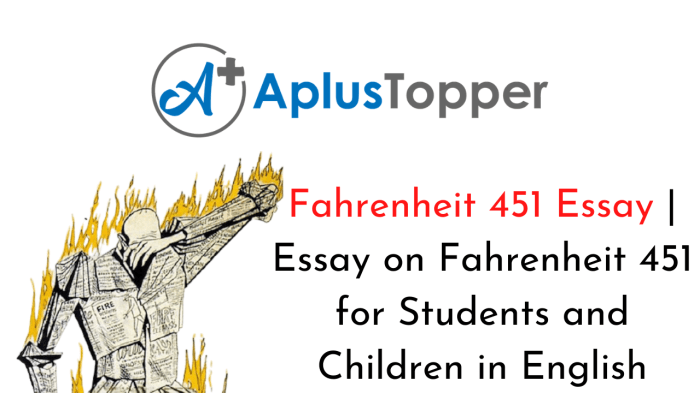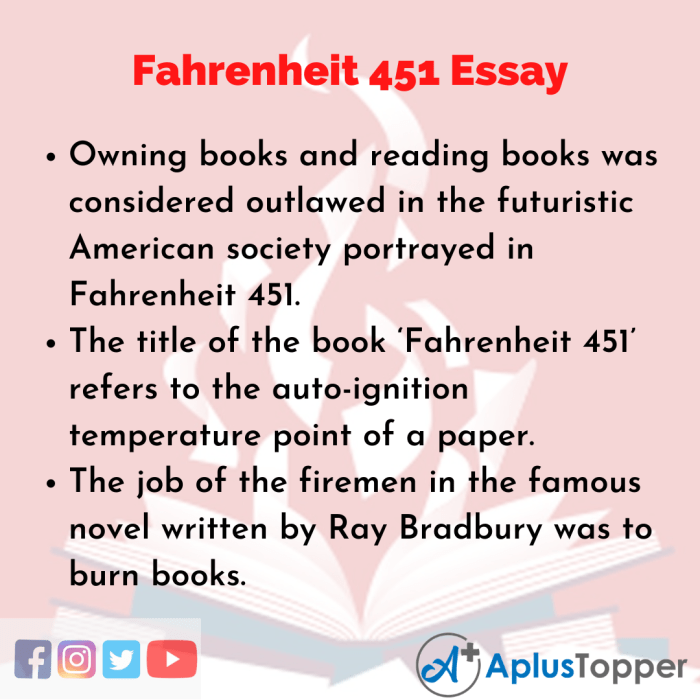Fahrenheit 451 pages 130-158 summary delves into the heart of Ray Bradbury’s dystopian masterpiece, exploring the transformative power of knowledge and the dangers of censorship. As Montag continues his journey, his interactions with books and literature challenge his beliefs and shape his destiny.
Through a detailed analysis of key events, character development, and symbolism, this summary provides a comprehensive understanding of the novel’s themes and their relevance to contemporary society.
Page 130-158 Overview

In pages 130-158 of Fahrenheit 451, Montag’s journey continues as he faces new challenges and encounters significant events that shape his character and the narrative’s trajectory.
These events contribute to the overall narrative by intensifying Montag’s conflict with society, exploring themes of censorship and rebellion, and revealing the destructive power of the government’s oppressive regime.
Montag’s Encounter with Clarisse
Montag’s encounter with Clarisse in the park marks a turning point in his life. Clarisse’s unconventional nature and thought-provoking questions challenge Montag’s preconceived notions and awaken a sense of curiosity within him.
The Burning of Beatty’s House
When Montag burns Beatty’s house, he symbolically rejects the oppressive society he has been a part of. This act of rebellion sets him on a collision course with the authorities and solidifies his transformation into an outcast.
The Meeting with Faber
Montag’s meeting with Faber introduces a wise mentor figure who provides him with guidance and support. Faber helps Montag understand the importance of literature and the dangers of censorship.
The Mechanical Hound’s Attack
The Mechanical Hound’s attack on Montag symbolizes the government’s relentless pursuit of dissenters. The Hound’s failure to kill Montag suggests that the power of the individual can overcome the oppressive forces of society.
The Burning of the City
The burning of the city by the Mechanical Hound represents the destruction of the oppressive society that Montag has come to reject. This event marks the end of the old order and the beginning of a new era.
Montag’s Transformation: Fahrenheit 451 Pages 130-158 Summary
Montag’s encounter with literature marks a pivotal point in his journey, as he embarks on a transformative odyssey that challenges his long-held beliefs and reshapes his understanding of the world.
Initially, Montag is a dedicated “fireman,” blindly adhering to the dystopian society’s dogma that books are dangerous and must be destroyed. However, as he delves deeper into the forbidden texts, he experiences a profound shift in his mindset.
The Power of Books, Fahrenheit 451 pages 130-158 summary
Through his clandestine readings, Montag discovers the transformative power of words and ideas. He realizes that books offer a gateway to knowledge, empathy, and critical thinking, which have been suppressed in his society.
- Montag’s encounter with “Dover Beach” by Matthew Arnold awakens his appreciation for the beauty and complexity of language.
- He is moved by the poignant themes of love, loss, and the ephemeral nature of existence in “The Book of Ecclesiastes.”
- The works of Shakespeare and Plato broaden his intellectual horizons, exposing him to new perspectives and challenging his preconceived notions.
The Power of Knowledge and Literature

In Fahrenheit 451, books and literature play a pivotal role in shaping individuals and society. They are a source of knowledge, wisdom, and imagination, offering a window into different perspectives and experiences. The novel explores the transformative power of knowledge and the dangers of censorship.
The Transformative Power of Knowledge
Books ignite intellectual curiosity and stimulate critical thinking. Through them, individuals can gain a deeper understanding of the world and their place within it. Knowledge empowers individuals, enabling them to make informed decisions and challenge established norms.
- Montag’s encounter with Clarisse and Faber awakens his desire for knowledge and understanding.
- Reading “Dover Beach” by Matthew Arnold opens his eyes to the beauty and complexity of poetry.
The Dangers of Censorship
Censorship, as depicted in the novel, is a tool used to suppress dissent and control the flow of information. It prevents individuals from accessing diverse perspectives and undermines their ability to make informed choices.
- The government in Fahrenheit 451 burns books to prevent the spread of ideas that challenge the status quo.
- The Firemen are tasked with enforcing censorship and destroying any remnants of literature.
The novel demonstrates that the suppression of knowledge and literature has devastating consequences for society. It creates a culture of fear, ignorance, and conformity, where individuals are unable to think critically or express their own ideas.
Beatty’s Characterization

Captain Beatty, the fire captain and Montag’s former mentor, is a complex and multifaceted character. He is a staunch advocate for the government’s censorship policies and a firm believer in the dangers of knowledge and literature.
Beatty is a master of rhetoric and uses his persuasive skills to manipulate and control others. He is a charismatic and articulate speaker, capable of swaying even the most skeptical individuals to his point of view. However, his beliefs are deeply rooted in dogma and blind adherence to authority.
Beatty’s Motivations
Beatty’s motivations are complex and multifaceted. He is driven by a genuine belief in the government’s censorship policies and a fear of the consequences of allowing knowledge and literature to proliferate.
- Loyalty to the Government:Beatty is fiercely loyal to the government and its policies. He believes that the government’s censorship laws are necessary to protect society from the dangers of free thought and dissent.
- Fear of Chaos:Beatty fears that allowing knowledge and literature to proliferate will lead to chaos and disorder. He believes that the government’s censorship policies are necessary to maintain order and stability in society.
Beatty’s Beliefs
Beatty’s beliefs are deeply rooted in dogma and blind adherence to authority. He believes that the government is infallible and that its policies are always in the best interests of society.
- Government Infallibility:Beatty believes that the government is infallible and that its policies are always in the best interests of society. He has no tolerance for dissent or questioning of the government’s authority.
- Dangers of Knowledge:Beatty believes that knowledge and literature are dangerous and that they can lead to dissent and rebellion. He believes that the government’s censorship policies are necessary to protect society from these dangers.
Beatty’s Symbolism
Beatty is a powerful symbol of authority and the dangers of blind adherence to dogma. He represents the oppressive forces that seek to suppress knowledge and free thought.
Beatty’s death at the end of the novel is a symbolic victory for freedom and the power of knowledge. It represents the hope that even in the darkest of times, the human spirit can prevail over tyranny and oppression.
The Role of Technology

In Fahrenheit 451, technology plays a significant role in shaping society and influencing individual behavior. Two prominent technological devices in the novel are the “mechanical hound” and the “Seashell Radios.”
The Mechanical Hound
- A robotic dog used by the government to track down and eliminate those who possess illegal books.
- Represents the oppressive power of the state and its ability to monitor and control its citizens.
- Symbolizes the fear and paranoia that permeate the dystopian society.
The Seashell Radios
- Tiny earpieces that constantly broadcast government propaganda and entertainment.
- Used to distract and pacify the population, preventing them from thinking critically or questioning the status quo.
- Represent the pervasive influence of mass media and its role in shaping public opinion.
Technology in Fahrenheit 451is a double-edged sword. While it has the potential to enhance communication and provide entertainment, it can also be used as a tool of oppression and control. The novel serves as a cautionary tale about the dangers of allowing technology to erode individual freedom and critical thinking.
Symbolism and Motifs

Fahrenheit 451 employs potent symbols and motifs that enrich its thematic tapestry. These elements add depth and resonance to the novel, providing insightful commentary on the nature of society, knowledge, and human experience.
Fire
Fire serves as a central symbol in the novel. It represents both destruction and renewal. On the one hand, it is the tool of the firemen, used to burn books and suppress knowledge. On the other hand, it symbolizes the transformative power of knowledge and ideas, as exemplified by the Phoenix, a mythical bird that rises from its own ashes.
Water
Water is another significant motif. It represents life, cleansing, and purification. The firemen’s use of water to douse fires symbolizes their attempt to extinguish knowledge and prevent its spread. However, water also has a positive connotation, as it is associated with the cleansing of the mind and the renewal of society.
The Phoenix
The Phoenix is a mythical bird that symbolizes rebirth and renewal. In the novel, it represents the resilience of knowledge and ideas. Despite the firemen’s efforts to suppress it, knowledge continues to find a way to survive and thrive. The Phoenix’s ability to rise from its own ashes suggests that even in the face of adversity, knowledge will endure.
Top FAQs
What is the significance of the mechanical hound in Fahrenheit 451?
The mechanical hound represents the oppressive force of the government and the dangers of technology used for surveillance and control.
How does Montag’s relationship with Faber evolve in pages 130-158?
Montag and Faber form a mentor-student relationship, with Faber guiding Montag’s intellectual awakening and providing him with forbidden books.
What is the role of fire in Fahrenheit 451?
Fire symbolizes both destruction and purification, representing the government’s efforts to suppress knowledge and the transformative power of ideas.

